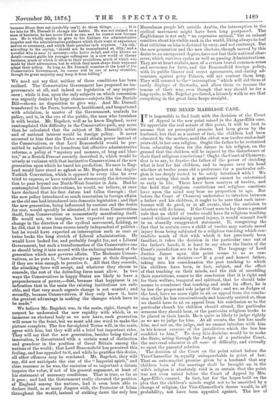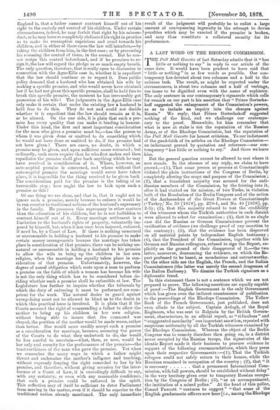THE MIXED MARRIAGE CASE.
Iis impossible to find fault with the decision of the Court 1 of Appeal in the new point raised in the Agar-Ellis case. To appreciate the real nature of this point, it will be best to assume that no prenuptial promise had been given by the husband, but that as a matter of fact, the children had been educated by the mother, until the eldest was twelve-and-a-half years old, in her own religion. Ought the father to be restrained from educating them for the future in his religion, on the ground that the children will be injured by the disturbance of their fixed religious convictions ? Ought the Court of Chancery, that is to say, to deprive the father of the power of deciding what is best for his children, and to inquire over his head whether at twelve years old a preference for a particular reli- gion is too deeply rooted to be safely interfered with We are not saying that such a preference cannot be entertained so early in life. There have been martyrs of twelve, and the hold that religious convictions and religious emotions have upon the mind may bear no proportion to ago. But before the Court of Chancery undertakes to interfere between a father and his children, it ought to be sure that such inter- ference will do good, or at all events, that the omission to interfere will do harm. If the Court were to lay down a general rule that no child of twelve could have its religious teaching varied without sustaining moral injury, it would commit itself to an absurdly exaggerated statement. If, recognising the fact that in certain cases a child of twelve may sustain moral injury from being subjected to a religious teaching which con- tradicts much of that with which it has previously been familiar, it takes the decision in the particular case out of the father's hands, it is hard to say where the limits of the Court's jurisdiction are to be drawn. The language of Lord Justice James upon this point seems to us as con- vincing as it is decisive :—" If a good and honest father, taking into his consideration the past teaching to which his children have been, in fact, subject, and the effect of that teaching on their minds, and the risk of unsettling their convictions, comes to the conclusion that it is right and for their welfare, temporal and spiritual, that he should take means to counteract that teaching and undo its effect, he is by law the proper and sole judge of that ; and we, as Judges of the land, have no more right to sit on appeal from the conclu- sion which he has conscientiously and honestly arrived at, than we should have to sit on appeal from his conclusion as to the particular church his children should attend, the particular sermons they should hear, or the particular religious books to be placed in their hands. He is quite as likely to judge rightly as we are to judge for him. At all events, the law has made him, and not us, the judge, and we cannot interfere with him in his honest exercise of the jurisdiction which the law has confided to him." To deny this doctrine would be to make the State, acting through the Judges of a particular Court, the universal educator in all case:: of difficulty, and virtually to upset the parental relation.
The decision of the Court on the point raised before the Vice-Chancellor is equally unimpeachable in point of law. That an ante-nuptial promise given by a husband that any children born of the marriage shall be brought up in the wife's religion is absolutely void is so certain that the point was not even raised before the Court of Appeal by Mrs. Agar-Ellis's counsel. In fact, but for the hopes built on the plea that the children's minds ought not to be unsettled by a change of religion, the Vice-Chancellor's decree would, in all probability, not have been appealed against. The law of England is, that a father cannot contract himself out of his right to the custody and control of his children. Under certain circumstances, indeed, he may forfeit that right by his miscon- duct, or be may have so completely abdicated his right in practice as to make its resumption capricious and cruel towards his children, and in either of these cases the law will interfere,—by taking the children from him, in the first case ; or by preventing his resuming the control of them, in the second. But he can- not resign this control beforehand, and if he promises to re- sign it, the law will regard the pledge as so much empty breath. The only question, therefore, that is really open to discussion in connection with the Agar-Ellis case is, whether it is expedient that the law should continue so to regard it. Does public policy demand that a husband who has obtained his wife by making a specific promise, and who would never have obtained her if he had not given this specific promise, shall be held free to break this specific promise, the moment he has irrevocably got possession of his wife ? The judgments in the Agar-Ellis case only make it certain that under the existing law a husband is held free to do this. They do not and could not decide whether it is expedient that the law should remain as it is, or be altered. On the one side, it is plain that such a pro- mise has every quality that can make it binding in honour. Under this head, the first and most important consideration for the man who gives a promise must be,—has the person to whom it was given done or omitted to do something which he would not have done or omitted to do, if the promise had not been given ? There are cases, no doubt, in which a promise may be given, and upon sufficient cause retracted ; but ordinarily, such cases require that he who first makes and then repudiates the promise shall give back anything which he may have received in consideration of it. Where, however, an ante-nuptial promise is concerned, and where without that ante-nuptial promise the marriage would never have taken place, it is impossible for the thing received to be given back. The consideration paid for the promise is the taking of an irrevocable step ; how ought the law to look upon such a promise as this ?
Of one thing we are clear, and that is, that it ought not to ignore such a promise, merely because to enforce it would be to run counter to traditional notions of the husband's supremacy in the family. He possesses this supremacy in other matters than the education of his children, but he is not forbidden to contract himself out of it. Every marriage settlement is a limitation to the husband's rights of property, voluntarily im- posed by himself, but, when it has once been imposed, enforced, if need be, by a Court of Law. If there is nothing unnatural or unreasonable in holding a husband to his promise to make certain money arrangements because the marriage has taken place in consideration of that promise, there can be nothing un- natural or unreasonable in holding a husband to his promise to allow the wife to bring up the children in her own religion, when the marriage has equally taken place in con- sideration of that promise. Unfortunately, however, the degree of moral obligation which rests upon a man to perform a promise on the faith of which a woman has become his wife is not the only thing which has to be considered before de- ciding whether such a promise shall be enforcible at law. The Legislature has further to inquire whether the tribunals by which the duty of enforcing it must be performed are com- petent for the work. The natural desire to guard against wrong-doing must not be allowed to blind us to the doubt in which this practical issue is involved. It is plain that if the Courts assumed the right of commanding a father to allow the mother to bring up his children in her own religion, without being able to insure that the command was obeyed, the position of the mother would be made worse, rather than better. She would more readily accept such a promise as a consideration for marriage, because, assuming the power of the Courts to do what they undertook to do, she would be less careful to ascertain—what, then, as now, would be her only real security for the performance of the promise—the trustworthiness of the man who gave the promise. Yet when we remember the many ways in which a father might thwart and undermine the mother's infliipnce and teaching, without expressly denying the right conceded to her by his promise, and therefore, without giving occasion for the inter- ference of a Court of Law, it is exceedingly difficult to say, with any certainty, or even with any reasonable confidence, that such a promise could be enforced in the spirit. This reflection may of itself be sufficient to deter Parliament from moving in the matter, even if it should be superior to the traditional notion already mentioned. The only immediate result of the judgment will probably be to enlist a large amount of conveyancing ingenuity in the attempt to devise penalties which may be exacted if the promise is broken, and may thus constitute a collateral security for its performance.



































 Previous page
Previous page